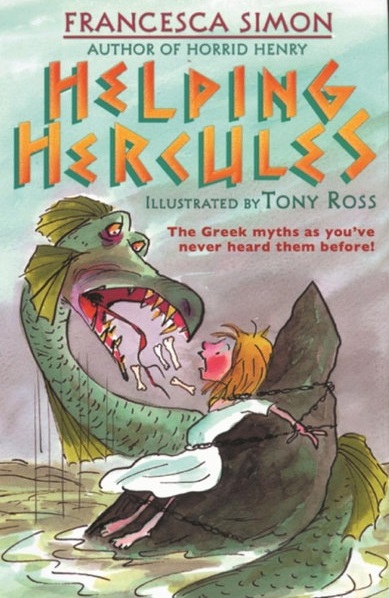Title of the work
Country of the First Edition
Country/countries of popularity
Original Language
First Edition Date
First Edition Details
Francesca Simon, Helping Hercules. London: Orion Children's Books, 1999, 128 pp.
ISBN
Genre
Alternative histories (Fiction)
Didactic fiction
Fiction
Illustrated works
Myths
Novels
Time-Slip Fantasy*
Target Audience
Crossover (Ages 7–9, children/young adults)
Cover

Cover courtesy of Hachette Children’s Group.
Author of the Entry:
Allison Rosenblum, Bar-Ilan University, allie.rose89@gmail.com
Peer-reviewer of the Entry:
Lisa Maurice, Bar-Ilan University, lisa.maurice@biu.ac.il
Elżbieta Olechowska, University of Warsaw, elzbieta.olechowska@gmail.com

Tony Ross
, b. 1938
(Illustrator)
Tony Ross was born in 1938 in London. He worked as a cartoonist, a graphic designer, as the Art Director of an advertising agency, and as Senior Lecturer in Art at Manchester Polytechnic after studying at the Liverpool School of Art. Ross is an illustrator of both his own (e.g. Goldilocks and the Three Bears from 1976) and other authors’ books. He has won 10 awards for his art and has worked on 43 books. Tony has illustrated over 800 books, including the wildly successful Horrible Henry series. Currently he lives in Cheshire in England. Tony likes to experiment with his art.
Sources:
Profile at the literature.britishcouncil.org (accessed: April 12, 2018).
Profile at the theguardian.com (accessed: April 12, 2018).
Profile at the us.macmillan.com (accessed: April 12, 2018).
Profile at the Harper Collins Publishers website (accessed: January 17, 2018).
horridhenry.co.uk (accessed: September 1, 2017).
There is also an interview available on YouTube (accessed: April 12, 2018).
Bio prepared by Allison Rosenblum, Bar-Ilan University, allie.rose89@gmail.com and Sonya Nevin, University of Roehampton, sonya.nevin@roehampton.ac.uk and Agnieszka Maciejewska, University of Warsaw, agnieszka.maciejewska@student.uw.edu.pl

Francesca Simon
, b. 1955
(Author)
Francesca Simon was born in the US and currently lives in London. She is the author of the popular series, Horrid Henry. According to Simon, she spent her childhood on the beach in California, and then went to Yale and Oxford Universities to study medieval history and literature. She has written over 50 children’s books and won The Children's Book of The Year at the Galaxy British Book Awards for Horrid Henry and the Abominable Snowman in 2008, as well as a Gold Blue Peter badge in 2009.
She worked for 12 years as a freelance arts journalist, writing for the Sunday times, and The Guardian amongst others. Francesca wrote her first children's book in 1989 and has gone from strength to strength ever since. She lives in London with her husband and son.
Sources:
Official website (accessed: June 24, 2018).
Review at charlotteslibrary.blogspot.co (accessed: January 17, 2018).
Bio prepared by Allison Rosenblum, Bar-Ilan University, allie.rose89@gmail.com
Summary
Helping Hercules tells the story of a young girl named Susan who does not want to help or do chores at home. She finds a magic coin that takes her back to Ancient Greece where she becomes entangled in scenarios from Greek mythology – she has to help Hercules clean out Augean stables, help Orpheus get Eurydice back from Hades, help Paris choose between the goddesses, help Bellerophon capture Pegasus to find the chimera, fight Medusa, deal with Midas, and help Hercules get the apples from the Garden of Hesperides.
Analysis
Helping Hercules is a book with eight chapters, each one depicting a situation that causes Susan discomfort – she is forced to do chores, is not chosen as the lead of the play, she does not play her instrument well. In each scenario, Susan wishes for an escape. Salvation comes to her in the form of a coin which acts as a time-travelling device, magically whisking Susan away from all her problems. There is a long-standing tradition of using time-travel to transport children back in time to teach them lessons or create amusing scenarios. Helping Hercules does both. Though Susan may think she escapes a troublesome situation back home, she finds herself in a more difficult one whenever she travels back to Ancient Greece. In each scenario, though the narrative is infused with a contemporary feel and lots of humor, Susan learns a particular lesson. When she doesn’t want to do her chores, she ends up having to help Hercules clean the stables. When she encounters Midas and is turned to gold, she learns to be careful what she wishes for, and while she constantly gets upset that she gets no credit for the help she gave in Ancient Greece, by the end of the book she is the one saying "thank you" to the characters of the past.
The illustrations are black and white sketches on random pages and are reminiscent of Roald Dahl, aiding the contemporary feel of the story.
The author includes a pronunciation guide at the end of the book.


